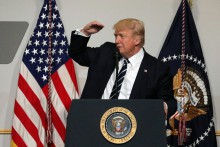Early on March 22, Kyiv time, it became known that US President Donald Trump would attend the NATO summit to be held in Brussels on May 25. White House spokesman Sean Spicer reported it on his Twitter page, thus announcing the first foreign visit of the American president. According to the spokesman, Trump intends to negotiate with partners in the North Atlantic Alliance “to reaffirm our strong commitment to NATO, and to discuss issues critical to the alliance, especially allied responsibility-sharing and NATO’s role in the fight against terrorism.”
The White House has also said that Trump will meet with NATO Secretary General Jens Stoltenberg on April 12 to discuss “the challenges of national and international security.” This will be the first meeting between the NATO secretary general and Trump after the latter’s inauguration as president.
On March 21, the Stoltenberg-Trump meeting was also announced by NATO spokesperson Oana Lungescu in Brussels. “They will discuss the importance of NATO for the collective defense and stability beyond the Alliance,” Lungescu stressed.
She also noted that the NATO summit in May would deal with “adapting the alliance to the new security situation, including its role in the fight against terrorism and the importance of increased defense spending, and better burden-sharing” between the allies.
By the way, Stoltenberg held a meeting with the Pentagon chief James Mattis in Washington on March 21. “Two hours of excellent talks with Sec. Mattis. Serious business but a very warm welcome. Always glad to be with such a strong friend of NATO,” he tweeted.
APRIL 12: STOLTENBERG IN THE WHITE HOUSE, TILLERSON IN MOSCOW
It should be noted that the statement of Trump’s intent to attend the NATO summit was made the day after it was reported that US Secretary of State Rex Tillerson would miss the meeting of foreign ministers of NATO member countries, which is scheduled for April 5-6. The US explained the secretary of state’s absence at the ministerial summit with President of China Xi Jinping’s visit to Washington on April 6-7. However, the media have learned that Tillerson will go to Russia on April 12, where he will meet with the Russian leadership. And in a strange coincidence, Trump will host the NATO secretary general at the White House on the same day, as mentioned earlier.
Either way, it is important that the US president has made up his mind regarding participation in the summit of NATO, which was founded in Washington. Let us recall that the summit was scheduled for February 2017, but due to Trump’s election as US president, it was resolved to postpone the meeting of leaders of member countries of the world’s only collective security system to the end of the first half of the year.
We all remember that during the election campaign Trump called NATO an outdated organization. While after the election, he urged NATO partners to get serious about his demand to increase their military budgets to 2 percent of GDP and take “concrete steps” to that purpose by the end of 2017. Still the question remains: what to expect from Trump at his first NATO summit.
On the other hand, Ukraine faces questions of its own, including how the Ukrainian government is going to prepare for this event, and whether a meeting of the NATO-Ukraine Commission (NUC) will be held during the summit, as was done in recent years. And probably the most important question is whether Ukraine will appoint a new ambassador to NATO after a nearly two-year absence, which would confirm its commitment to integrating into that system of collective security as fast as possible.
So far, the headquarters of NATO has not given clear answers to two questions: how long will the summit last, and whether a meeting of the NUC will be held as part of it. The Day’s sources explained it by the fact that the agenda of the summit was being changed almost by the hour.
“HOPE FOR THE BEST BUT PREPARE FOR THE WORST”
Senior vice president of the Center for European Policy Analysis Edward LUCAS thinks that Europe should hope for the best but prepare for the worst. “The ‘sensible’ wing of the Administration – people like Mattis, Tillerson, McMaster, Pence – have yet to show they are in control. Trump continues to amaze and dismay with his petulant, erratic, and ill-informed behavior. The most likely outcome of this is paralysis. America is not likely willfully to betray its allies, but it is not providing the leadership they need – and that may not change for years to come,” he commented for The Day.
Senior fellow of the Brookings Institution, Dr. Constanze Stelzenmueller in her commentary for The Day pointed out that “the US will be expecting very specific commitments by Europeans on defense spending, particularly Germany. Europeans are on course to increase their defense budgets anyway – motivated mainly by Russian revisionism – but American expectations may be higher than Europeans can realistically achieve.”
On the other hand, commenting the Ukrainian issue the German expert noted: “During the Merkel-Trump press conference, President Trump accepted German leadership in the Minsk process – thereby also accepting that framework. That is bad news inasmuch as it’s a flawed framework; but at the same time it’s good news, because it was possible to imagine a much more critical US approach.”








